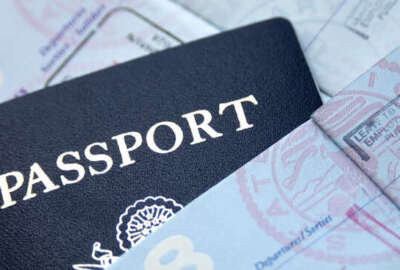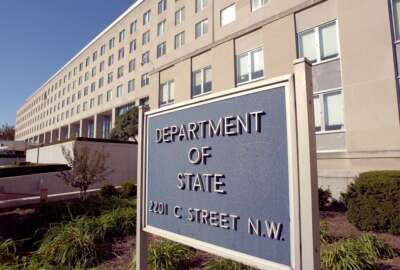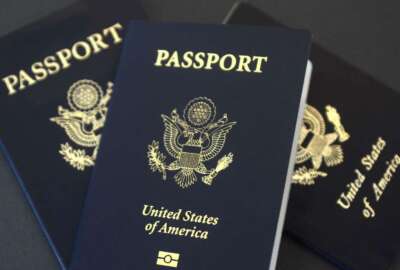
State Dept. moves to phase two reopening in DC area amid workforce concerns
Agency facilities in the national capitol region have moved to phase two of the State Department's "Diplomacy Strong” reopening strategy, which allows up to 80%...
The State Department has brought more of its workforce back to the office in the Washington, D.C. metro area as part of its multi-phased reopening strategy.
A State Department spokesperson told Federal News Network that agency facilities in the National Capital Region have moved to phase two of its “Diplomacy Strong” reopening strategy, which allows up to 80% of employees to return to the office.
The spokesperson said State Department leadership made the determination after “carefully assessing the local conditions” and coordinating with the Bureau of Medical Services. The spokesperson said employees should still follow social distancing guidelines and wear face coverings when at department facilities.
“Using guidance from the White House, CDC, and local governments combined with objective criteria informed by data and good judgment, department leadership continues to monitor operational conditions,” the spokesperson said. “Ensuring the safety and security of our people and assets remain the highest priority.”
On Monday, the day phase two went into effect in the D.C. area, the American Foreign Service Association, which represents about 16,800 active-duty and retired Foreign Service officers, as well as other federal employees, wrote a letter outlining its reopening concerns to Secretary of State Mike Pompeo.
The D.C. metro area, AFSA said in a message to members, hasn’t seen a 14-day negative trend in new COVID-19 infections, and five of the seven indicators on the agency’s Diplomacy Strong dashboard indicate the agency shouldn’t move to the next stage of reopening.
“While we share our members’ eagerness to get back to in-person work, AFSA believes that the criteria set out by the department – data, conditions on the ground in specific locations, and employee safety – have not been met,” the association wrote.
AFSA also urged agency leadership to consider the fact that schools will likely resume virtual classes in the fall, “causing additional hardship to members with children.
“We hope that the department reconsiders this decision or, at the very least, ensures that there is no minimum percentage of employees which must report to work. Each bureau and office must be empowered to make decisions based on individual circumstances,” the association wrote.
To that point, the State Department spokesperson said employees who are in “vulnerable populations” are not required to return to the office.
“During this phase, telework flexibilities are still encouraged given childcare, eldercare, and transportation concerns,” the spokesperson said.
Pompeo told members of the Senate Foreign Relations Committee Thursday that agency offices have the “discretion to decide what’s best for their teams and their rotations” under each phase of reopening.
The State Department reopened 11 of its passport centers in June after Sen. James Lankford (R-Okla.) led six other senators in a letter expressing concern about the growing passport backlog.
At this point, the Bureau of Consular Affairs has moved six passport agencies to phase two reopening, while 10 passport agencies remain in phase one of reopening.
The only key difference between the two phases is the return of more passport specialists to the office. Prior to reopening, they were out on weather and safety leave.
In both phases one and two, the State Department prioritizes customers who need a passport in the next 72 hours for life-or-death emergencies. The agency, citing processing delays, still encourages all other customers to wait to submit new applications.
This week, the agency processed 206,000 passport applications and shrank the backlog to 1.15 million applications.
However, House lawmakers are calling on the State Department to clear through its backlog of passport applications more quickly. The bipartisan Passport Backlog Elimination Act, introduced earlier this month, would require the agency to give Congress a plan of how it expects to process passport applications still in the pipeline.
“The State Department needs to be transparent about its plans to process outstanding passport applications to assure these citizens that they will get their documents soon and that it is doing everything possible to eliminate this backlog,” House Oversight and Reform Committee Chairwoman Carolyn Maloney (D-N.Y.), one of the bill’s sponsors, said in a statement.
The legislation would also require the agency’s inspector general to complete an audit of backlog reduction efforts.
Government operations subcommittee chairman Gerry Connolly (D-Va.), another of the bill’s sponsors, called the backlog “unacceptable.”
“Too many of our constituents are left in limbo, not sure if they will receive their passport in time and some don’t even know the status of their application. The legislation is a significant step in reducing the backlog and delivering this crucial service to our constituents.
Copyright © 2025 Federal News Network. All rights reserved. This website is not intended for users located within the European Economic Area.
Jory Heckman is a reporter at Federal News Network covering U.S. Postal Service, IRS, big data and technology issues.
Follow @jheckmanWFED





